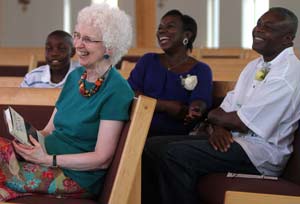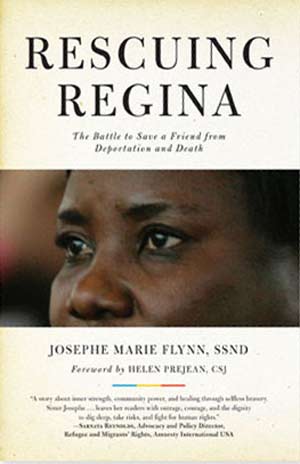 School Sister of Notre Dame Josephe Marie Flynn, foreground, and left to right, Christopher Bakala, 10, Regina Bakala, and David Bakala react to a speaker prior to a book signing gathering at St. Mary Parish in Hales Corners on Monday, July 18. Sr. Josephe Marie wrote “Rescuing Regina,” detailing the Bakala family’s journey through the immigration system. (Catholic Herald photo by Allen Fredrickson)HALES CORNERS — An anguishing, yet determined struggle to save a friend from deportation and certain death in the Democratic Republic of the Congo (Congo) led Sr. Josephe Marie Flynn to write a book about that battle, which started six years ago. This School Sister of Notre Dame felt called to “expose” the immigration system in the United States.
School Sister of Notre Dame Josephe Marie Flynn, foreground, and left to right, Christopher Bakala, 10, Regina Bakala, and David Bakala react to a speaker prior to a book signing gathering at St. Mary Parish in Hales Corners on Monday, July 18. Sr. Josephe Marie wrote “Rescuing Regina,” detailing the Bakala family’s journey through the immigration system. (Catholic Herald photo by Allen Fredrickson)HALES CORNERS — An anguishing, yet determined struggle to save a friend from deportation and certain death in the Democratic Republic of the Congo (Congo) led Sr. Josephe Marie Flynn to write a book about that battle, which started six years ago. This School Sister of Notre Dame felt called to “expose” the immigration system in the United States.
“It’s hurting the very people we’re pledged to protect,” she said in a recent interview with your Catholic Herald.
“The system is so complicated because it’s so big. Unless you understand it, you can’t see how it’s hurting people,” she said.
Regina Bakala was saved from deportation in 2005 with the help of Sr. Josephe Marie, at the time Adult and Family Christian Formation Director at St. Mary Catholic Faith Community, Hales Corners.
The book, “Rescuing Regina: The Battle to Save A Friend from Deportation and Death,” named by the online Huffington Post as “one of the 20 most anticipated books of the summer of 2011,” was published in July by Lawrence Hill Books, Chicago.
Book transformed friends
Through the ongoing nightmare that led to Regina’s deportation, the two friends were transformed. Regina’s faith was deepened and she came to terms with the early loss of her mother, while Sr. Josephe Marie went through a major change regarding family issues with which she had struggled in the past.
Sr. Josephe Marie met the Bakalas – Regina and her husband David – who had worked secretly for democracy in the Congo, when they arrived on the doorstep of St. Mary in 2000. With them was their infant daughter, Lydia. The family was embraced by the St. Mary community and gradually Sr. Josephe Marie learned that Regina had been raped twice within a nine month period by soldiers in the Congo. David had also been severely tortured.
As they shared the horrifying details of their past, Sr. Josephe Marie recalled saying, “This is a book.”
 “Rescuing Regina,” written by School Sister of Notre Dame Josephe Marie Flynn, was published in July by Lawrence Hill Books, Chicago.Regina responded by telling her, “You write it, Sister.”
“Rescuing Regina,” written by School Sister of Notre Dame Josephe Marie Flynn, was published in July by Lawrence Hill Books, Chicago.Regina responded by telling her, “You write it, Sister.”
But Sr. Josephe Marie replied, “Oh, no, not me.”
Eleven years later, the book was published, with a foreword by Sr. Helen Prejean, a member of the Congregation of St. Joseph and author of “Dead Man Walking.”
According to Sr. Josephe Marie’s book, even before Regina and David were married they had started the dangerous work of trying to bring democracy to the Congo. As a newlywed, Regina was speaking to a gathering in her mother’s home village just five or six weeks after her wedding. Men in camouflage burst into the meeting, grabbed her and took her by truck to an abandoned hut where two of them raped her.
She was raped a second time by soldiers and after the second incident, she fled the Congo for her life not even telling David. He was later accosted and tortured causing him to have nightmares until recently.
Separately, the couple fled the Congo and eventually found refuge and were reunited in the United States. Yet, their struggles were not over.
Family settles into life in U.S.
Sitting in Sr. Josephe Marie’s apartment, Regina recalled her first meeting with the nun after the family arrived from North Carolina.
“I laughed and said my mother’s name was Josephine Mondele. Mondele means white,” she said, referring to Sr. Josephe Marie.
The family settled into life in the community and reached out to other immigrants in the area, often inviting them to live in their small apartment, even when Regina was pregnant with their second child, Christopher.
David, formerly an astute accountant and purchaser at Kinshasa’s (capital of the Congo) five-star, 500-room Hotel Intercontinental, now struggled from serious Post Traumatic Stress Disorder (PTSD) due to the torture. He started taking classes to improve his English and obtained a job in the maintenance department at the Sacred Heart School of Theology. Regina, a teacher in the Congo, found a job in the development office at Sacred Heart School of Theology, about a half mile away in Hales Corners.
ICE officers detain Regina after home raid
In 2005, Regina confided in Sr. Josephe Marie that she “had a dream that immigration was going to take me.” The nun tried to reassure her to dismiss that thought. But during Holy Week, on March 22, 2005, several Immigrant and Customs Reinforcement Officers (ICE) raided the small home on which the Bakalas had just put a down payment, and handcuffed Regina in front of her husband and two children. They objected to her kissing her children goodbye and prevented her from changing out of her pajamas into street clothes. Sr. Josephe Marie writes that the Bakalas didn’t realize the ICE needed a search warrant to even enter their home, but it was too late.
When that happened, Sr. Josephe Marie recalled, “I started keeping records. I wanted to serve that family.” Regina was incarcerated at the Kenosha County Detention Center. She, too, was suffering from PTSD.
“’Why did God let this happen to me?’” Sr. Joseph Marie said Regina asked her. She said she didn’t know.
“Maybe a book,” Regina said again.
In trying to help Regina, Sr. Josephe Marie had contacted seven immigration attorneys who refused to take the case because it was “too complicated.”
She finally convinced Chicago attorney Mary Sfasciotti to take it. Previously, three attorneys had disappointed Regina when they said they would represent her – one had taken all her money, according to Sr. Josephe Marie.
When asked by your Catholic Herald if she ever felt like giving up, Sr. Josephe Marie said, “I never felt like giving up – I couldn’t give up for Regina.”
Save Regina Committee formed
Still, Sr. Josephe Marie realized that she could not do all the work alone nor manage the high attorney fees. Through the formation of the Save Regina Committee, a core committee of parishioners such as Bob Mutranowski and others at St. Mary School, they mobilized the school community because both Bakala children attended the parish school. The larger church community started contributing, and one former colleague of Sr. Josephe Marie at St. Mary gave $10,000 out of an inheritance from her aunt’s estate. Eventually, even people from other countries sent contributions. Mutranowski took the lead, said Sr. Josephe Marie, by telling the committee, “Nothing is going to be said negative. We are here to save Regina.”
A hearing in the immigration court of Chicago in January 2005 was cancelled, but one was held during Holy Week on April 2, 2007. Regina was granted asylum on a derivative basis as David’s wife due to his torture and severe PSDT, as noted by his clinical psychologist who participated by phone during the trial at the Midwest Immigration Court.
Judge O. John Brahos, who previously, according to Sr. Josephe Marie, had “sneered” at David and had him testify during his own case for seven hours straight, and then told him he’d give him his decision in four months, which was no asylum, was again presiding.
However, this time, with the persistence of Sfasciotti and Hal Block, David’s Milwaukee immigration lawyer, within a short amount of time, Brahos told the Bakalas, “I’m pleased to grant you joint application for asylum. I hope you have a long and happy life in the United States.”
‘Now we write the book’
After she was freed, Regina said to Sr. Josephe Marie, “Now we write the book, Sister.” With encouragement from others and with prayer, Sr. Josephe Marie began the project.
Four years later, the Bakalas’ children continue their education at St. Mary while David is taking accounting classes whenever “I can afford to,” he said, in hope of working a finance position.
Regina hopes to take education courses to become a teacher in the Milwaukee area. She also wants to work with asylum seekers and refugees who have experienced the trauma she and David endured. Each holds the same positions they obtained after they first came to St. Mary. While Regina has her green card, David is still waiting to receive his before they can become United States citizens.
While David says he misses the open African community which often mingled outside, under the stars in the Congo, he has come to realize, “My family is St. Mary.”
In a recent phone interview, he said several weeks ago he remembered someone asking Regina about St. Mary.
“She said the community was like a family to us. I said that’s true.”
He’s thrilled that his children, Lydia, now 12, and Christopher, 10, “now have the opportunity if they work hard, to have a better future. Freedom is not like this in the Congo, where you don’t have democracy,” he said.
